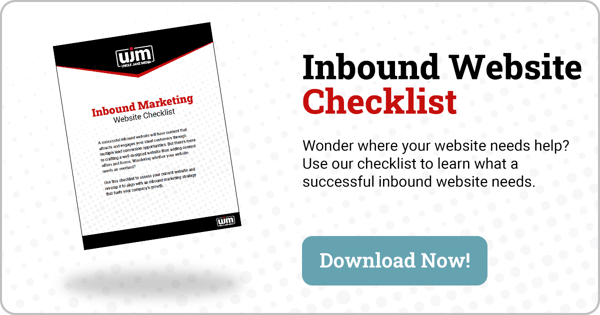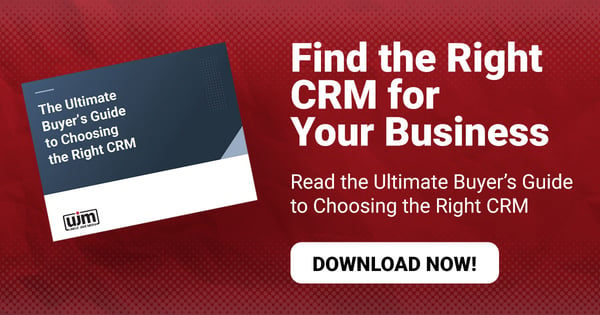
Must-Have Lead Generation Tools For Your Website

Your website should be so much more than just an electronic business card or brochure. It's time to make your website a lean, mean, money-makin', lead-generation machine!

To help convert visitors into leads, there are several website must-haves for lead generation that shouldn’t be ignored. By adding these elements to your site, you’ll be more successful in generating interest and capturing information from potential customers.
Take a look at the tactics that can make your website a more effective lead gen tool:
- Build searchable content with a blog
- Share valuable resources with your ideal buyers
- Convert sales qualified leads with a contact form
- Make It easy for your visitors to follow you on social media
- Get organized with a CRM
Create a Blog
Blogs are website gold for many reasons because they help with Search Engine Optimization and lead generation. Well-written posts provide value to your site’s visitors by educating them in your area of expertise and generating a sense of trust that you are truly an expert in that field.
Benefits of blogging on your company website include:
- The content helps drive traffic to your website,
- blogs enable you to better convert your website traffic into leads,
- Sharing insights on valuable topics allows your business to establish authority in an industry,
- Blogging can continue to help your business grow and attract new customers months and even years after publication
The hardest part about creating a blog for your website is staying consistent with new and helpful topics. But don't let writer's block stop you.

When planning out your blog content, think of your ideal customers and what their mindset was when they were in the Awareness or Consideration phase of the buyer’s journey. What questions or objections did they have? Commonly asked questions in your sales process are great topics for your blog.
Adding a “Subscribe Now” section is also valuable because subscribers will receive notifications every time a post is published, keeping your company top of mind. Plus, it will provide you with names/emails of potential clients with whom you may want to follow up.
Share Free Resources
Any time you visit a website and are most likely offered a free resource of some kind, chances are you have filled out a form to get it.
For example, on our site, we offer a "Free Inbound Website Checklist”. Visitors have to fill out a simple form to download the checklist. Due to the nature of the content, we know that those who submit the form are genuinely interested in more information on building a professional and effective website.
After they fill out that form, we will want to follow up with them to stay top-of-mind and provide more valuable resources. Of course, we don’t want to bombard their inboxes with emails, but it’s a great way to see who is interested. Plus, as with the blog, you are providing helpful information to the consumer and establishing yourself as an expert in the field.
You can check out our helpful checklist by clicking below:

Build a User-Friendly Contact Form
This may seem like a no-brainer, but you’d be surprised how many websites don’t have a contact form. When crafting this form, be thoughtful about the fields. Too many fields to fill out could dissuade leads, but too few may not provide you with all the information you need.
The contact form is also a great way to help you gather information to round out your buyer persona and better understand your customer. Perhaps even add a calendar widget that would allow visitors to automatically schedule a call or consultation.
Check out what our Contact Form looks like.
Promote Your Social Media Channels
Don't be shy about promoting your social media channels!

Perhaps visitors to your website may not be ready to fill out a contact form or subscribe to your blog quite yet, but they may want to follow you on social media.
Make it easy for folks to find you online and provide these icons and links in your website’s header or footer. Some websites even have a widget that allows visitors to see what type of content you post before deciding to follow you.
If you like our blog, you will love what we share on our social channels. Follow us below!
Capture and Organize Your Leads with a CRM
CRM stands for customer relationship management. CRM software is a tool that connects with your website and helps your business capture and track leads. Think of it as a database that contains all of your contacts' names, phone numbers, email addresses, and other pertinent information.
A CRM allows you to track every interaction you have with each of your prospects, leads, and customers — from the first time they visit your website to their most recent actions — which can improve lead generation over time. A lead might first be added to your CRM by filling out a contact form on your website. After a few follow-up emails with a sales rep, your team can update the contact's information to better reflect what you’ve learned about them. Now you can make better sales and marketing decisions on how to best appeal to their needs.
The following are some benefits of using a CRM:
- A better understanding of who your target audience is by tracking interactions throughout the marketing and sales cycle (i.e., initial outreach to closing deals). This can help generate more leads, as well as increase conversion rates by providing customers with relevant content at each stage in the buying process.
- Efficient organization of your prospects, leads, vendors, and customers' contact information.
- Improved performance in contact-based marketing efforts, like email marketing campaigns.
- Increased accountability among reps/sales teams because there's no question about whether or not someone has reached out before (and if so, when)
Is a CRM Right For Your Company?
Businesses of all sizes use a customer relationship management platform for many reasons, but the overall goal is to make converting website visitors into leads more efficiently and learn more about your leads over time.
If you're interested in adopting a CRM tool, we recommend you start with HubSpot's free CRM for staying organized and growing your business through inbound marketing. The Uncle Jake Media team is a HubSpot Certified Partner, so we can help you get started.
Figuring out what CRM is right for your business can be hard. Finding a CRM that works best to help your business grow is important. That's why we have created the Ultimate Buyer’s Guide to Choosing the Right CRM. You can download a free copy to get started on discovering if a CRM is right for your business.

Learn More About Lead Generation Tactics
Once you put all of these lead generation elements together on your website, your business is on the right path to growth. Your website is a key tool in your digital marketing strategy, why not use it to its fullest potential?
Use these resources to learn more about optimizing your website and marketing strategy for lead generation:
- How To Design Your Website As An Effective Marketing Tool
- 3 Examples Of Successful Inbound Marketing Websites
- Top Digital Marketing Tools You Should Be Using To Grow Your Business
- Free Inbound Marketing Website Checklist
Or you can get your website optimized lead gen faster by partnering with a digital marketing agency that can help you implement the right tools and manage them for you.
Set up a free 15-meeting with our team member, Brady, to chat about your current marketing challenges and lead generation tactics.

